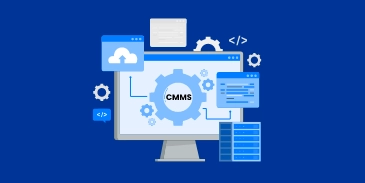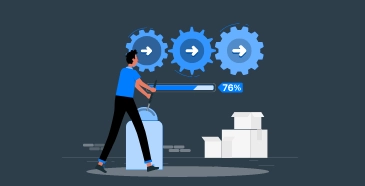Looking to run data-led operations and maintenance? Your CMMS is a major roadblock.
A data-led O&M regime lends increased reliability and accuracy to your team’s decision-making, leading to enhanced asset performance and reduced costs. Your CMMS is a valuable component of this regime but its poor data quality and inconsistency means you can’t realize your data and team’s full potential.

The problem with modern CMMS software
Computerized Maintenance Management Systems (CMMS) have come a long way in helping users manage their maintenance activities effectively. However, they don’t fit the bill when it comes to supporting fully data-led operations and maintenance regimes. Here are some crucial shortcomings of a typical, modern-day CMMS software that are holding you back:
No Data Quality And Consistency Checks
Modern-day CMMS has static checklist-based forms, no data quality checks with respect to quantitative measurements or qualitative interpretation in terms of what technicians observed or why they made a certain decision.
Limited Context On Asset Performance
For sites with no BMS or IoT data, the situation becomes even more important as the planned maintenance regimes could be the only way to source data points and build context on asset performance and maintenance history.
High Cost And Opportunities Lost
Implementing a CMMS rigged with poor data quality can prove costly for your team. It limits your ability to create a comprehensive picture of equipment performance and maintenance needs. In short, you lose out on crucial opportunities.
Complexity And Scalability Issues
Most CMMS platforms are complex and may not scale well as your team and maintenance needs grow. Handling larger datasets and a more extensive network of equipment can strain the capabilities of such systems.
Hurts Your Digital Transformation Efforts
All of this restricts the progress facility management and maintenance teams can make when it comes to their Digital Transformation journey from the perspective of running an effective data-led O&M regime.
What needs to change?
One would think facility management and maintenance teams wouldn’t be stuck with such fundamental problems in this day and age. But CMMS vendors hardly ever draw attention to these crucial aspects and you ultimately end up buying what vendors are pushing. Here’s what needs to change:
Enable behaviourial change with the right tools and training
Encourage technicians to adopt better data entry methods and learn the importance of data quality. Provide the right tools and training to help them make progress a daily habit and improve data quality over time.


Allow more flexibility in recording technician observations
Enable technicians to be more flexible with the kind of data they can collect for each part of the maintenance checklist — from images to videos, measurements, and more.
Ensure data quality at source
Xempla’s in-built framework captures user intent with increased accuracy, facilitates more descriptive inputs, and asks for mandatory measurements and recordings to generate better data quality scores each time.

How small changes make a big difference
When you ensure your CMMS data is high-quality and contains rich context, it becomes a powerful asset for informed decision-making in your maintenance efforts. Here’s how this small change can make a big difference:
Improved Maintenance Planning And Lower Costs
Consistent data allows maintenance teams to plan and prioritize work effectively, and identify critical assets and tasks to avoid unnecessary maintenance, minimize downtime and cost of asset operations.
Technician Growth And Increased Knowledge Base
The emphasis on data consistency and quality leads to better learning for technicians and an increased knowledge base, ensuring consistent service delivery and tackling the overall knowledge issue the industry is facing.
Better Recommendations For Asset Performance
High-quality data and technician observations combined with IoT and BMS data power better recommendations for teams, providing a clear picture of asset performance and maintenance history.
No IoT, BMS Data? Get Started Anyway
In sites without IoT or BMS data available, a mechanism for more accurate and contextual maintenance information within CMMS enhances your ability to start being data-led.


